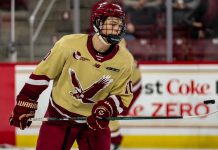Like most youngsters with any hockey ability, Lee Goren had dreams of the National Hockey League. And, for a Winnipeg native, the standard route to the NHL is normally thought to be through the Canadian major junior system. So Goren, like so many of his friends, went off to the WHL and the Saskatoon Blades.
Five years later, with an NCAA national championship and Frozen Four Most Outstanding Player Award under his belt, he’s the poster child for the college side of the neverending NCAA vs. major junior debate.
Goren did not feel things were working out in Saskatoon. So, he sat down with his dad, Chuck, a former player at Lake Superior, and decided to go to Tier II in Minot with the intention of heading to a U.S. college.
Because that would mean taking a year off, only two schools showed interest. Goren verbally committed to Michigan Tech at one point, but later switched allegiances to North Dakota.
“They wanted me to do different things [in Saskatoon] that I didn’t want to do,” Goren said. “I wanted to play hockey and have fun, and I wasn’t having any fun.”
Goren practiced with North Dakota in 1997, but had to sit while the Sioux won the NCAA championship. It was frustrating being a freshman and not being able to participate, but what he learned that year, helped him over the next three.
“I know how the seniors [in ’97] felt right now,” Goren said. “Being able to win your last game is amazing.
“Those guys had unbelievable leadership. We had a starting goalie, Toby Kvalevog, who had a freshman goalie [Aaron Schweitzer] take over halfway through the year. Just watching him and the way he reacted to it, and being the positive guy on the bench the second half of the year, was huge for us. Then seeing Dane Litke and Mark Pivetz and Kevin Hoogsteen, they led us.
“[This year] we had 28 guys here who loved being around each other and loved having fun, working hard every day, day in and day out, and they deserve this.”
The usual argument in favor of major juniors is that players participate in as close to an NHL type of system as possible. They play over 70 games in a season, and they play with fighting and a center line. The argument in favor of college hockey is that, for late bloomers especially, you can’t beat the kind of improvement you get out of working on skills every day in practice.
In recent years, the NHL has seen former U.S. college players and Europeans dominate the rookie statistics, lending credibility to that argument. Could Goren be the next in line?
“My dad’s ultimate goal for me is to play in the NHL, and mine too, and major junior was considered the fast way,” said Goren. “But I wasn’t ready, I wasn’t developed. Our choice [to go to college] was a good choice.
“Just this year, I’ve improved two to three times from last year. Skating, stickhandling, shooting, everything. We’re on the ice every day, working hard, and the way Coach drills us into the ground every day, if you continue to work as hard as he wants you to, you’re going to get better.”
That decision by Lee and his dad couldn’t have worked out better. He struggled through his sophomore season, with mononucleosis and then a shoulder injury. But by the end of his junior year, he had blossomed. By this season, Goren had become a First-Team All-American and the nation’s leading goal-scorer. And on his dad’s 50th birthday, Lee scored two goals and won the tourney MOP award, providing a most fitting conclusion to the last five years.
The last two seasons were disappointments for the Sioux, who won the WCHA regular-season title but lost in the Final Five and the NCAA tournament. This year, it was Wisconsin’s turn to pull that trick, while the Sioux refocused and charged into the postseason.
“We owed Wisconsin, and we beat them in the WCHA Final Five,” Goren said. “And we owed Boston College because they knocked us out last year, and I wanted them to come out of that side because I wanted a shot at them. They put a sour feeling in our gut last year, and we wanted to do the same thing this year.”
If Goren is to become an NHL star, it could very well be with the Boston Bruins, who own his rights. Ironic, considering the Sioux defeated Boston University to win the ’97 title and Boston College to win this year.
“I don’t know how that’s going to work out,” Goren said with a smile. “But I haven’t thought about it much.”
Adding to the fitting nature of it all, if Goren cannot crack the NHL right away, he would start his pro career where he ended his college one, in Providence, with the AHL’s Bruins.
“If I go on to play, whether it be with Boston or Providence, that would be great,” he said. “I just want to play hockey.
“It’s all up in the air. In May I’ll graduate, so I’d like to do that, get my degree. I’m a month away, and I might just do that.”
At the very least, in the last four years Goren has learned he can do anything he puts his mind to.


